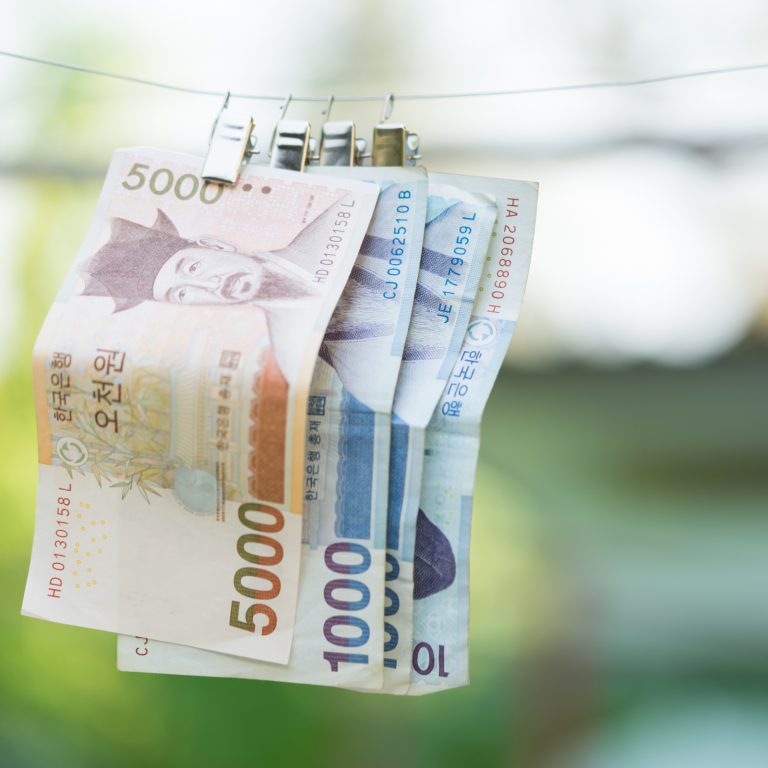New Research: Laundering of Illicit Funds Less than 1% of Bitcoin Transactions
 The Foundation for Defense of Democracies’ Center of Sanctions and Illicit Finance in conjunction with blockchain analytics company, Elliptic, has published a study seeking to track the circulations of illicit funds within the bitcoin economy from 2013 to 2016. The research concludes that the share of funds of illicit origin comprises less than one percent of all bitcoin flows, and has exponentially declined as the cryptocurrency has gained increasing adoption and popularity. Also Read: Autopsy of the Bitconnect Implosion: Ponzi, Centralization, Governance
The Foundation for Defense of Democracies’ Center of Sanctions and Illicit Finance in conjunction with blockchain analytics company, Elliptic, has published a study seeking to track the circulations of illicit funds within the bitcoin economy from 2013 to 2016. The research concludes that the share of funds of illicit origin comprises less than one percent of all bitcoin flows, and has exponentially declined as the cryptocurrency has gained increasing adoption and popularity. Also Read: Autopsy of the Bitconnect Implosion: Ponzi, Centralization, GovernanceStudy Seeks to Track Illicit Bitcoin Flows From 2013 to 2016
 The report states that “Criminals – often early adopters of new technologies – quickly appreciated that bitcoin has unique properties that could potentially serve their interest in evading law enforcement.” The research asserts that “bitcoin’s illicit use is mainly based on anecdotal evidence, usually without supporting data analysis of how it is used across geographical regions, or trends over time.” Although the report concedes that “it is impossible to quantify exactly how much bitcoin is used illicitly,” the research seeks to utilize Elliptic’s “forensic” blockchain network analysis to estimate the methods employed and scale of money laundering that is conducted using bitcoin. “The research intends to provide insights for policymakers and financial industry leaders who want to better understand illicit finance risks arising from bitcoin,” in order to greater inform the development of legislation addressing the “Anti-Money Laundering and Combating the Financing of Terrorism (AML/CFT)” concerns pertaining to bitcoin – which largely stem from “Users of bitcoin employ[ing] pseudonyms rather than names,” and cryptocurrency being “transferred without intermediaries and across international borders as easily as sending an email.”
The report states that “Criminals – often early adopters of new technologies – quickly appreciated that bitcoin has unique properties that could potentially serve their interest in evading law enforcement.” The research asserts that “bitcoin’s illicit use is mainly based on anecdotal evidence, usually without supporting data analysis of how it is used across geographical regions, or trends over time.” Although the report concedes that “it is impossible to quantify exactly how much bitcoin is used illicitly,” the research seeks to utilize Elliptic’s “forensic” blockchain network analysis to estimate the methods employed and scale of money laundering that is conducted using bitcoin. “The research intends to provide insights for policymakers and financial industry leaders who want to better understand illicit finance risks arising from bitcoin,” in order to greater inform the development of legislation addressing the “Anti-Money Laundering and Combating the Financing of Terrorism (AML/CFT)” concerns pertaining to bitcoin – which largely stem from “Users of bitcoin employ[ing] pseudonyms rather than names,” and cryptocurrency being “transferred without intermediaries and across international borders as easily as sending an email.”Study Methodology
 The report draws off “extensive analysis of a narrow data sample of bitcoin transactions between 2013 and 2016,” however, states that “The parameters of the study were purposefully narrow to keep the data manageable, which likely minimized the volume of illicit bitcoins considered for analysis.” The research employs “Elliptic’s forensic analysis tool, which combines public blockchain data with a proprietary dataset of bitcoin addresses associated with known entities, to provide visibility into who is transacting with whom in bitcoin.” The study examines 214 conversion services, “including virtual currency exchanges, gambling sites, and mixers,” in addition to bitcoin circulations originating from 102 illicit entities. The illicit entities considered include 30 darknet marketplaces, 6 darknet services, 16 darknet vendors, 5 identified Ponzi schemes, 19 ransomware schemes, and 26 entities engaged in fraudulent activities
The report draws off “extensive analysis of a narrow data sample of bitcoin transactions between 2013 and 2016,” however, states that “The parameters of the study were purposefully narrow to keep the data manageable, which likely minimized the volume of illicit bitcoins considered for analysis.” The research employs “Elliptic’s forensic analysis tool, which combines public blockchain data with a proprietary dataset of bitcoin addresses associated with known entities, to provide visibility into who is transacting with whom in bitcoin.” The study examines 214 conversion services, “including virtual currency exchanges, gambling sites, and mixers,” in addition to bitcoin circulations originating from 102 illicit entities. The illicit entities considered include 30 darknet marketplaces, 6 darknet services, 16 darknet vendors, 5 identified Ponzi schemes, 19 ransomware schemes, and 26 entities engaged in fraudulent activitiesMoney Laundering Comprises Less Than One Percent of Bitcoin Circulations
 The findings state that “The amount of observed bitcoin laundering [is] small,” with “darknet marketplaces such as Silk Road and, later, AlphaBay,” comprising “the source of almost all of the illicit bitcoins laundered through conversion services” identified in the study. The research states that “Bitcoin exchanges received the greatest amount of identified illicit bitcoins out of all conversion services” – likely owing to the fact that exchanges “process the majority of bitcoin transactions overall.” Of the 120 exchanges included in the study, 50% of illicit volume is attributed to just two European Union (EU)-based exchanges. Online gambling sites and mixers, however, are identified as processing “the highest proportion of bitcoin laundering with their platforms.” The findings state that 97 percent of incoming transfers to gambling and mixer websites can be attributed to just three services – which in turn account for almost half of the illicit volume analyzed.
The findings state that “The amount of observed bitcoin laundering [is] small,” with “darknet marketplaces such as Silk Road and, later, AlphaBay,” comprising “the source of almost all of the illicit bitcoins laundered through conversion services” identified in the study. The research states that “Bitcoin exchanges received the greatest amount of identified illicit bitcoins out of all conversion services” – likely owing to the fact that exchanges “process the majority of bitcoin transactions overall.” Of the 120 exchanges included in the study, 50% of illicit volume is attributed to just two European Union (EU)-based exchanges. Online gambling sites and mixers, however, are identified as processing “the highest proportion of bitcoin laundering with their platforms.” The findings state that 97 percent of incoming transfers to gambling and mixer websites can be attributed to just three services – which in turn account for almost half of the illicit volume analyzed.The Majority of Illicit Bitcoin Transactions Were Processed in Europe
 The research concludes that “conversion services based in Europe received the greatest share of illicit bitcoins out of identifiable regions,” receiving “more than five times as much as North American services.” The report also identifies that whilst “Asian conversion services processed the highest share of all incoming bitcoin transactions in 2015 and 2016,” such “accounted for a disproportionately small share of bitcoin laundering during those years.” Despite the findings, it is recognized that “a large percentage of conversion services that receive illicit bitcoins appear to conceal their country of operations.”
The research concludes that “conversion services based in Europe received the greatest share of illicit bitcoins out of identifiable regions,” receiving “more than five times as much as North American services.” The report also identifies that whilst “Asian conversion services processed the highest share of all incoming bitcoin transactions in 2015 and 2016,” such “accounted for a disproportionately small share of bitcoin laundering during those years.” Despite the findings, it is recognized that “a large percentage of conversion services that receive illicit bitcoins appear to conceal their country of operations.”Darknet Markets Account for Vast Majority of Illicit Funds Transferred Using Bitcoin
 The research states that darknet marketplaces account for more than 97% of illicit funds circulated throughout the bitcoin economy between 2013 and 2016. The only year examined in which darknet markets were found to have accounted for less than 97% of illicit funds was 2016, during which 80.42% of illicit funds were attributed to anonymous free markets – owing to the rise of ransomware which was estimated to have been the origin of 15.75% of the bitcoins associated with illegal activities entering into conversion services that year. The research indicates that the flow of bitcoins via darknet marketplaces is highly centralized – with over 50% of illicit funds originating from no more than two anonymous marketplaces during each year. During 2013 it was estimated that almost 90% of illicit funds came from The Silk Road, whilst in 2014 Agora and Silk Road 2.0 accounted for over 40% of illicit bitcoin flows respectively. In 2015 the share of illicit funds across individual darknet markets became more pluralized, with four sites accounting for between approximately 9 and 14 percent of black market bitcoins, although Agora’s share increased to almost 48% during that year. Following the collapse of numerous darknet markets in 2016, more than 75% of illicit funds identified in the study were deemed to have originated from either Alphabay or Nucleus Market.
The research states that darknet marketplaces account for more than 97% of illicit funds circulated throughout the bitcoin economy between 2013 and 2016. The only year examined in which darknet markets were found to have accounted for less than 97% of illicit funds was 2016, during which 80.42% of illicit funds were attributed to anonymous free markets – owing to the rise of ransomware which was estimated to have been the origin of 15.75% of the bitcoins associated with illegal activities entering into conversion services that year. The research indicates that the flow of bitcoins via darknet marketplaces is highly centralized – with over 50% of illicit funds originating from no more than two anonymous marketplaces during each year. During 2013 it was estimated that almost 90% of illicit funds came from The Silk Road, whilst in 2014 Agora and Silk Road 2.0 accounted for over 40% of illicit bitcoin flows respectively. In 2015 the share of illicit funds across individual darknet markets became more pluralized, with four sites accounting for between approximately 9 and 14 percent of black market bitcoins, although Agora’s share increased to almost 48% during that year. Following the collapse of numerous darknet markets in 2016, more than 75% of illicit funds identified in the study were deemed to have originated from either Alphabay or Nucleus Market.Policy Recommendations
 The foundation concludes that in order to effectively combat money laundering through bitcoin mixers and online gambling services, “Financial authorities in all jurisdictions must increase AML enforcement” of said websites. The report also advocates that law enforcement “not only target darknet websites,” but expose “their vulnerabilities publicly” in order to “increase customer skepticism” regarding the integrity and perceived security of said platforms. Emphasis is placed on the need for regulatory institutions to mandate that “European virtual currency exchanges […] improve AML practices.” The report states that the absence of clear legislation pertaining to cryptocurrency-to-cryptocurrency exchanges results in EU-based exchanges adopting robust AML policies out of choice, rather than obligation. It is noted that the European Union has begun to take steps designed to tackle such, as evidenced by the updating of the EU’s “2015 Anti-Money Laundering Directive so that its regulations cover virtual currency exchanges and custodian wallet services.” However, the research concludes that “even the updated language has loopholes that could permit significant cryptocurrency laundering.” Lastly, the researchers advocate that “The U.S Congress should mandate a National Commission for Digital Currency Preparedness and help develop a national blockchain technology innovation strategy” in order to “counter state actors aiming to use cryptocurrencies to circumvent U.S., EU, and UN sanctions.” What is your response to the study’s conclusions regarding money laundering in the bitcoin economy? Share your thoughts in the comments section below!
The foundation concludes that in order to effectively combat money laundering through bitcoin mixers and online gambling services, “Financial authorities in all jurisdictions must increase AML enforcement” of said websites. The report also advocates that law enforcement “not only target darknet websites,” but expose “their vulnerabilities publicly” in order to “increase customer skepticism” regarding the integrity and perceived security of said platforms. Emphasis is placed on the need for regulatory institutions to mandate that “European virtual currency exchanges […] improve AML practices.” The report states that the absence of clear legislation pertaining to cryptocurrency-to-cryptocurrency exchanges results in EU-based exchanges adopting robust AML policies out of choice, rather than obligation. It is noted that the European Union has begun to take steps designed to tackle such, as evidenced by the updating of the EU’s “2015 Anti-Money Laundering Directive so that its regulations cover virtual currency exchanges and custodian wallet services.” However, the research concludes that “even the updated language has loopholes that could permit significant cryptocurrency laundering.” Lastly, the researchers advocate that “The U.S Congress should mandate a National Commission for Digital Currency Preparedness and help develop a national blockchain technology innovation strategy” in order to “counter state actors aiming to use cryptocurrencies to circumvent U.S., EU, and UN sanctions.” What is your response to the study’s conclusions regarding money laundering in the bitcoin economy? Share your thoughts in the comments section below!Images courtesy of Shutterstock
Need to calculate your bitcoin holdings? Check our tools section. The post New Research: Laundering of Illicit Funds Less than 1% of Bitcoin Transactions appeared first on Bitcoin News.
1 agpra Alphabay Anonymous anti-money laundering Circulation Concludes Constitutes darknet Defense Democracies Elliptic EU European Union Featured foundation Foundation for Defense of Democracies’ Center of Sanctions and Illicit Finance Free Market Funds Illicit Laundering Less Money Laundering N-Economy Research Sanctions Silk Road transactions



